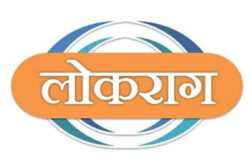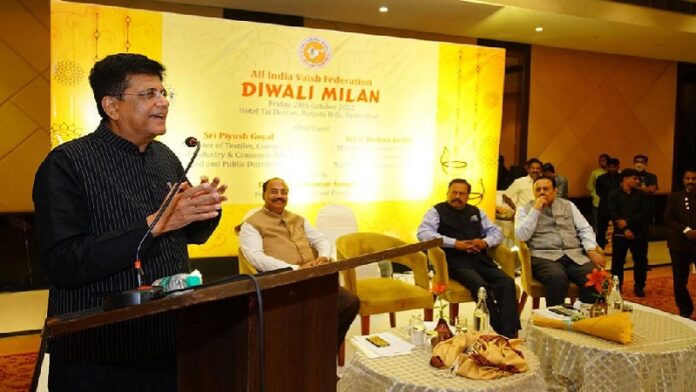Union Minister Piyush Goyal asked India’s business community to give primacy to products that are made in India. He was addressing the All India Vaishya Federation (AIYF) in Hyderabad. Minister emphasized the need to promote industry and manufacturing in India and said that this would help boost employment and bring in prosperity to the lives of our citizens. Endorsing PM Modi’s call to the travellers and tourists to spend at least 5 percent of their travel budget on locally made products, the Minister said that our talented artisans, craftsmen and entrepreneurs deserve to be supported and promoted.
Piyush Goyal pointed out that in the last 30 years, India’s GDP had grown by 11.8 times. He reminisced that there was a time when a large section of the population was focussed upon securing the very basic necessities of life such as food, clothing and shelter. He observed that the situation has improved tremendously now due to the government’s extensive focus on structural reforms that make sure that people were freed from the constant struggle for the necessities of life.
He went on to say that the reform that was closest to his heart was the governments success in building over 12 crore toilets, taking safe sanitation, a very basic necessity, to every household in the nation. “It was not just a matter of toilets but that of dignity and self-respect, especially for our women,” he stressed.
The Minister said that the government had ensured food security to nearly 80 crore citizens by supplying food grains under the National Food Security Act (NFSA) and additional 5 kilo food grains per person per month. He said that it should be a matter of gratification to tax payers that their money was being used well to help those in real need. 50 Crore people are now being given free, quality healthcare, clean drinking water is now taken to every household through taps under the Jal Jivan Mission, he noted.
He referred to all these initiatives as the foundational work to ensure that our population, especially our youth are freed up to take up activities that spearhead growth and development, thereby helping us reap our incredible demographic dividend. “Our youth is now free from struggles for necessities and is highly aspirational. They aspire to become innovators and entrepreneurs and drive growth”, he added.
The Minister spoke of the need to secure the basic necessities of women, especially that of menstrual hygiene. Expressing concern over girl children dropping out of schools on attaining puberty, the Minister stressed that the government was providing sanitary napkins at very low prices. He called for more awareness programs to educate women about various aspects of menstrual hygiene to protect and empower them. The Minister asked AIVF to strive to ensure that in the next one year every single woman in the nation had awareness and access to sanitary pads.
The Minister stressed that India was ready to take decisive steps towards becoming a developed nation, a vishwaguru. He expressed confidence that India’s huge youth population had the capability to drive this quest forward. “India is the sole bright spot in the world today. The world is looking towards India with great hope”, he added. He noted that developed nations were now aspiring to enter into FTAs with India and said that the fastest FTA in the world was concluded between India and UAE in just 88 days. He added that the rest of the GCC nations were also gearing up to sign FTAs with India.
The Minister spoke of the Prime Minister’s stress on the need to go back to our roots and said that India’s history, its culture, traditions and value systems, had great strength in them. He asked to bring an end to social discrimination and said that divisive tendencies have no place in New India. The Minister referred to the ‘panch pran’ given by Prime Minister Narendra Modi and said that the pran of unity and oneness formed an integral part of the panch pran. He said that if India was to truly realize its immense potential, it was essential that the whole nation worked together with oneness and unity.
He expressed confidence that if the whole nation worked together as one, our children would learn of our efforts through their history books rather than the glory days of kings, Nizams and colonialism.

















